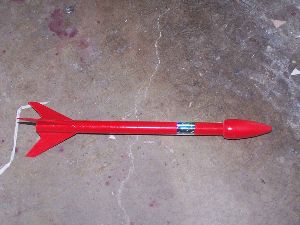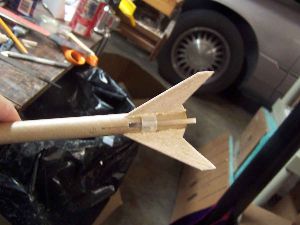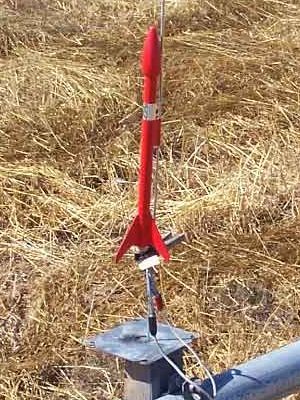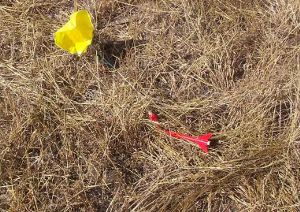| Construction Rating: | starstarstarstar_borderstar_border |
| Flight Rating: | starstarstarstar_borderstar_border |
| Overall Rating: | starstarstarstar_borderstar_border |
| Manufacturer: | Estes  |

Brief:
Next week, my club is going to have an informal 13mm duration competition. I never win these things, but I do like to
take part. With only a week to go, I realized that I didn't have anything ready to enter and started looking through
the inventory. I found the Red Alert. It seemed light and would go pretty high on an A despite the draggy nose cone.
Besides, it was near the front of one of the pegs and that made it easy to choose since I recently reorganized and hung
everything up.
The Red Alert comes with a streamer and I like streamers but for this one, I will probably try to stuff a parachute in it to get the maximum hang time.
Construction:
Construction on this one started out by coupling the 2 BT-5 tubes. There was a longer one and a shorter one and they
were joined with an insert coupler and yellow glue.
The motor mount came next. The coupler for the 2 tubes acts as a thrust ring and a slit was cut just aft of it to accept the engine hook. A plastic band was then slipped around the tube and the hook to hold it in place and was secured with yellow glue.
 The three fins came on a die-cut balsa sheet. The cut lines were so fine that I had a very difficult time
even seeing them. I found them by gently flexing the balsa and looking for the cracks to open up. I would then give the
lines a little encouragement with an X-Acto knife and do it again. Eventually I got them out.
The three fins came on a die-cut balsa sheet. The cut lines were so fine that I had a very difficult time
even seeing them. I found them by gently flexing the balsa and looking for the cracks to open up. I would then give the
lines a little encouragement with an X-Acto knife and do it again. Eventually I got them out.
The fins were stacked and sanded and then the leading, outer and trailing edges were sanded round. A slot to fit around the engine hook band also had to be filed.
Unlike the fins, the launch lug standoff is not provided as die cut. Instead, I was instructed to cut two pieces of scrap to the given dimensions and glue them together. I stacked and sanded them first and then put them together with yellow glue. They needed to be made uniform after they dried.
The distinctive nosecone needed only to have the screw eye inserted and glued into place.
The kit comes with a wraparound fin marking guide. It was used to transfer fin, engine hook, and launch lug lines to the BT and then the lines were extended. The fins were glued in place using a double glue joint and yellow glue.
After the fins were in place, the filleting process began. That gave me time to work on a few other things. As I mentioned above, the launch lug standoff was laminated together with 2 pieces of scrap. When it had dried, I sanded it square and then glued on the lug.
When the lug was safely glued to the standoff, I glued the standoff to the BT along the line given by the marking guide.
Based on some advice from TRF and my experience with the ASP Hangtime, I decided to use an external shock cord. Accordingly, a length of Kevlar® was glued into the root edge of one of the fillets. A notch to accommodate the Kevlar® was also filed into the top end of the BT.
PROs: Simple build.
CONs: None, except for the default shock cord to be dealt with later.
Finishing:
I test fit everything together and then started applying balsa fillercoat. The rocket took only two coats before
being judged ready for sanding.
The sanding was rudimentary and then the rocket was primed with Kilz. Another sanding saw it ready for being painted red. I put tape on the Kevlar® to keep it from getting painted and then set it up in the booth and shot it with Rustoleum Red. A day later, I gave it another coat of red and, when it was dry, peeled the tape off of the shock cord. After that, there was just a simple, single holographic sticker to apply.
The original purpose of the sticker was to hold the rubber shock cord after it had been fed through a slit in the BT. I used mine just for decoration. It turns out that the sticker was not long enough to go all the way around the BT. This hacked me off at first, but I then realized that the gap is the same size as the launch lug standoff. It made sense.
PROs: Easy.
CONs: I still don't like stickers, even if it makes sense on this rocket.
Construction Rating: 3 out of 5

Flight:
The day of the competition dawned and I prepped the rocket with an A3-4T. It actually looked kind of cool sitting on
the pad. When all was clear, it launched, flew straight, and deployed at apogee. I was worried about the tightly packed
chute, but it deployed.
For flight, this is a nice one. For hang time, its mediocre at best. I got 50 seconds. Still, it was good enough to come in second!
PROs: This is a good performer, even with the drag inducing nosecone.
CONs: It's small enough to drift far and be easily lost.
Recovery:
As noted in the build section, I did not follow instruction as to the shock cord technique. What is provided for in
the kit is to make a slit near the forward end of the BT and then feed through that slit a pathetically short length of
glorified rubber band. The "decal" is then used to secure the rubber band in place. The other end is tied to
the NC and a short piece of plastic flagging is tied to the rubber band to act as a streamer. It is my considered
opinion that this model is small enough and light enough to recover as a tumble. The streamer will, however, aid in
spotting it in the air.
 I substituted a 12" plastic parachute from Dr Zooch. Its not easy to stuff into the small tube but
it did accomplish my purposes.
I substituted a 12" plastic parachute from Dr Zooch. Its not easy to stuff into the small tube but
it did accomplish my purposes.
PROs: Not much is needed.
CONs: Shock cord method, rubber too short, rubber too weak, and streamer too short.
I would have given this another point based on the flight were it not for the standard recovery system.
Flight Rating: 3 out of 5
Summary:
The distinctive nose cone of this one makes it stand out from other small rockets of similar stature. It is easy to
assemble and performs well. I don't like the standard recovery system, but I am very opinionated in that regard.
Overall Rating: 3 out of 5
Other Reviews
- Estes Red Alert By John Lee
Brief: This is a simple, high-performance OOP rocket from the Estes catalog of '91 and '92. Construction: It includes an engine block, paper shock cord mount, launch lug, lug offset, shock cord, streamer, screw eye, balsa nose cone, BT-5, and 3 die-cut fins. The build is easy and instructions are excellent. I sanded the fins to an airfoil shape, filled the tube spirals, ...
 |
 |
Flights
 |
 |